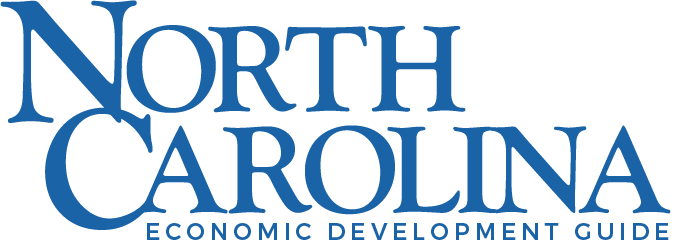Economic Development Q&A: Machelle Baker Sanders, opening doors
Since taking the helm as N.C. Secretary of Commerce in early 2021, Machelle Baker Sanders has helped steer the state’s economic development. Her department plays a key role in landing businesses that are making big investments and creating thousands of jobs. She’s also overseen new programs and tactics for supporting existing businesses, attracting new ones and increasing diversity.
Machelle Sanders came to the post with private and public experience. Most recently she was the Secretary of Administration leading the department that acts as the business manager for the state and oversees construction, purchasing and contracts.
Sanders also has 30 years of management and leadership experience in the pharmaceutical and biotechnology industries. She was vice president of manufacturing and general manager at Biogen’s largest manufacturing facility in Research Triangle Park and also held high-level posts at Purdue Pharma and Diosynth-Akzo Nobel.
Sanders earned a Bachelor of Science degree in Biochemistry from N.C. State University and a Master of Health Administration from Pfeiffer University.
She’s the mother of adult twin daughters and a native of Belhaven in Beaufort County, where she loves time on the Albemarle Sound and Pungo River.
What’s a key accomplishment so far in your tenure as Secretary of Commerce?
I’m proud of the work towards transitioning North Carolina to a clean energy economy. We have established an office of Clean Energy Economic Development that focuses on transitioning North Carolina as a leader in the clean energy space. The N.C. Task Force for Offshore Wind Economic Resource Strategies was created. The work we are doing will bring potentially billions of dollars and (many) jobs to North Carolina in the clean energy sector. One of our universities, N.C. A&T State, was recognized and earned a grant for clean energy workforce. They received a grant for a new program called STEPs4GROWTH, which funds clean energy workforce training. I’m also proud of the launch of North Carolina’s strategic economic development plan, “First in Talent,” and its intentional incorporation of diversity, equity and inclusion throughout the plan.
What is the department’s role in recruiting new businesses?
We work with Chris Chung and the Economic Development Partnership of North Carolina as well as economic developers and workforce partners across the state with recruiting new businesses. We consult with local officials, state agencies and the General Assembly to ensure that we, as a state, align needs, strengthen, and expand key industries for long-term job creation, investment, and good corporate citizenship.
The other responsibility is Commerce’s role in negotiating deals in the best interest of our state with the support of the Governor and General Assembly. Our objective is always a positive economic impact for North Carolina while bringing family sustaining jobs across the state.
Rural North Carolina is a vital part of the state’s economy. It is a priority of the Department of Commerce to have a keen, sharp focus and to remain inclusive. The department of Commerce is involved in helping those communities become more sustainable. We’re talking about water and sewer infrastructure and broadband infrastructure. The governor has made it a priority to expand broadband access across North Carolina. That is vitally important and long overdue, frankly.
You created programs to boost women at Biogen and in state government. What impact have they had and are there other opportunities?
Through programs like those at Biogen, and the Lady Cardinals in state government, we are focused on female talent and increasing the presence of women in the STEM space or in public board rooms or leadership positions. It’s really to celebrate and highlight the unique skills and abilities that women bring to any setting, work environment or community. (The Lady Cardinals STEM Program for High School students) was designed to reach young girls and encourage them to pursue STEM fields. We have hosted (Lady Cardinal students) in Commerce. The STEM field has good paying jobs that lead to careers. The average salary five years ago was about $76,000.
We also know there is inequality of salaries between men and women not only in the STEM space, but across sectors. When we are able to encourage and sponsor young girls into these fields, it can help close that gap, we hope, by providing them equal opportunity to have a career in the STEM space. Greater female representation will accelerate innovation, improve businesses’ bottom line, and expedite solutions for the world’s greatest problems. Women are the bedrock of society.
We need policies and champions to address the salary inequities (in all industries) that are solely because of gender. There are females who are working in the same role as males with the same level of experience and qualifications yet are paid substantially less. The Council For Women Report found women in North Carolina earn a median income of about $36,000, an average of $8,600 less than men. That is not acceptable. We also know if the current trend continues, working women will see equal pay in 2060. Not only is (addressing the inequality) the right thing to do, it’s an economic issue and it’s a family issue. It’s not just a woman’s issue.
Tell us more about OnboardNC.
There is a lack of gender diversity on public boards. I am a member of OnBoardNC and our focus is to increase gender diversity on public boards. I would like to see companies in North Carolina reap the benefits of including women on their public boards. Not only will these women enjoy personal development and career growth but these companies will also get the best return on their investments and have the best bottom line for their business. Greater female representation will accelerate innovation, improve businesses’ bottom line, and expedite solutions for the world’s greatest problems.
Data shows public boards with gender and racial diversity as well as diversity of thought and perspective are the companies that have breakthrough products and services garnering competitive advantage.
In North Carolina, we value diversity and inclusive business practices. We want to help businesses evolve to transform themselves to inclusive practices. Progress has been made.
Why should businesses locate in North Carolina?
North Carolina is the best place to expand and to create a thriving business. We have premier universities and community colleges with strong private and public partners across the state.
We have an excellent quality of life. It’s an unparalleled quality of life. You can live, work and thrive here. This is a welcoming state and community. Our environment fosters entrepreneurship and innovation.
We have a great business climate, recognized as the best in the nation. We can help businesses navigate and hit their operational timelines. We have shovel-ready sites. We are also a state that not only embraces diversity and inclusion. We live it in our communities.
When we were recognized by CNBC as the “No. 1” place to do business in the country, they talked about how we get things done. We collaborate across the aisle and across communities, across the state — rural and urban, beaches to mountains. We are a collaborative state and the way we get things done really matters and shows up in the success we’ve had.
We do not do this only when a company is assessing our state or starting to work with our state. We are lifelong partners. North Carolina can be counted on to lift your boat, to rise, and to
shine with you.
What is your favorite place to vacation in North Carolina?
The place I love to vacation most of all is at (my childhood) hometown of Belhaven. It’s a relaxing place. It’s a beautiful small, quaint town on the Pungo River and Albemarle Sound. There are one-of-a-kind shops on our Main Street and the best restaurant in the state, I believe. Spoon River. People are the warm charm of Belhaven. There’s nothing better than eastern North Carolina.

